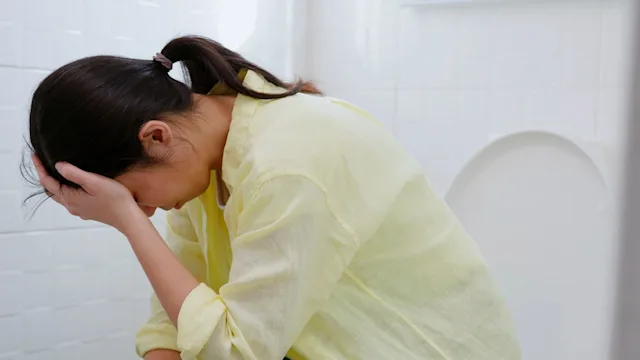Key takeaways:
A urinary tract infection (UTI) happens when germs invade your urinary tract and grow there.
A UTI can burn and make you feel like you need to pee frequently.
Healthcare providers prescribe antibiotics to clear up an infection.
A urinary tract infection — or UTI — is an infection in any part of your urinary tract. It happens when bacteria enter through the urethra and multiply in the bladder.
Typical symptoms include burning when peeing, feeling like you need to pee a lot, and cloudy or smelly pee. Some people report belly pain, fever, or chills.
Healthcare providers prescribe antibiotics for UTIs. They may also suggest drinking lots of fluids to flush out the bacteria.
Search and compare options
Here’s how three women describe their experiences with UTIs and how they found relief.
Don’t let a UTI linger
Tara Skubella, a 50-year-old tantra guide in Colorado, has experienced recurrent UTIs since childhood.
She says learning good hygiene, like wiping from front to back, helped her have fewer UTIs as a child.
“I really didn’t get them again until my early 20s, when I was sexually active,” she says.
Her main symptoms were a burning sensation and a feeling that she had to pee all the time, but nothing would come out. Sometimes, she had blood in her urine. One of Tara’s worst experiences with a UTI was when she developed a kidney infection and ended up in the hospital.

Over the years, antibiotics usually made her UTIs go away, Tara says. But then, the antibiotics she was prescribed stopped working.
- AmoxicillinGeneric Amoxil
- AugmentinAmoxicillin/Potassium Clavulanate
- ActiclateDoxycycline Hyclate
“Over time, my body began to build up resistance to antibiotics,” she says.
That made her focus on what she could do to prevent UTIs. So she tried holistic prevention measures, such as cranberry juice and cranberry supplements. She found extra hydration kept her immune system strong. She also found she was sensitive to latex condoms. And she noticed that drinking wine seemed to irritate her bladder.
Her advice to others experiencing UTI symptoms is to seek help instead of waiting it out.
“If you are susceptible to UTIs, it is super important to go to the doctor right away,” Tara says. “One of the things I would change is letting them linger, trying to take care of it myself. Cranberry pills are great, but they only go so far.”
The link between sexual intercourse and UTIs
Cassie Leigh, a 28-year-old digital creator in Florida, began experiencing UTIs when she was in high school. It was around the time she became sexually active. She noticed the majority of her UTIs came after having sexual intercourse.
Being in high school — and not having someone to confide in about sexual activity — Cassie says she was “totally confused” about why she was having UTIs and what to do.
“I came from a really conservative family as far as sex education goes,” Cassie says. “I was kind of left on my own.”
She tried to ignore her symptoms for as long as possible. But that never worked.
When she couldn’t stand her symptoms any longer, “I would just tell my mom that ‘it burns whenever I pee,’” she recalls. Her mom would take her to an urgent care clinic, where a provider would prescribe her antibiotics.

Cassie describes the feeling of a UTI as being an “intense irritation” — a burning sensation during urination, and an extreme urgency to pee.
“It’s very uncomfortable,” she says. “It’s like you just want to stay on the toilet because you feel like you constantly need to pee.”
Cassie didn't feel shame for getting UTIs or seeking treatment, but she remembers feeling down.
“I was kind of sad,” she says. “I felt like my immune system was just not working. I would get them [UTIs] and my friends wouldn’t.”
In her late teens, her doctor ordered a kidney and bladder scan to rule out any physical reason for her UTIs. The scans came back normal.
Like Tara, Cassie also tried cranberry pills to help support her urinary tract health. But her biggest discovery was that peeing after having sexual intercourse was the best prevention.
Once her gynecologist made her aware of the importance of “aftercare,” — or your care after sex — Cassie says she experienced a dramatic decrease in UTIs.
“I just want to tell other people my story because I do not want them to go through what I did,” she says. “I’m super passionate about this stuff [reproductive health]. So many of us grow up under-educated. Then we question ‘What is wrong with me? Why is this happening to me?’ Really, it’s just that we haven’t been given the knowledge and the information we need to keep our bodies healthy.”
UTIs are painful, not shameful
For Heather Lovato, a 39-year-old entrepreneur in California, frequent UTIs seemed to kill the romance.
“I used to suffer from chronic UTIs that took away a deeper connection during intimacy,” she says. “I was constantly getting up right after sex to do my routine [and go to the bathroom]. And by that time, the moment to connect after being intimate felt gone.”
She wanted to avoid UTIs at all costs because she hated the symptoms.

“There was definitely urgency, and then kind of like a burning sensation,” she says. “It felt like pins and needles down there."
Her fear of getting a UTI also led to some anxiety.
“I’d be having sex and enjoying the moment, and then all of a sudden, I’m like, ‘Oh, my gosh, am I going to get a UTI?’ All of these intrusive thoughts would start happening.”
That left her with all kinds of other feelings.
“I felt so embarrassed, because there’s a sense of shame and stigma, like this shouldn’t be happening,” Heather says.
She felt better when she started taking d-mannose supplements, made from sugar extracts found in fruits like cranberries and apples. That inspired her to create a company focused on women's reproductive health.
Now, she takes supplements not just to prevent UTIs but to make her feel better overall. She prefers products that contain magnesium, vitamin D, vitamin C, potassium citrate, vitamin B6, organic cranberry extract powder, and calcium.
Now that she has gone years without having a UTI, she says she's able to enjoy a more relaxed and intimate sex life.
What does the doctor say?

Patricia Pinto-Garcia, MD, MPH
Medical Editor
Urinary tract infections (UTIs) are incredibly common. People of all ages get UTIs — from young infants to older adults.
Many things affect whether you get a UTI. The majority of these things are completely out of your control — like the length of your urethra or whether bacteria stick to your bladder. It’s important to remember that getting a UTI isn’t about something you did or didn’t do. UTIs can just happen and most people won’t be able to pinpoint triggers.
It’s important to see a healthcare provider as soon as possible if you’re having symptoms of a UTI. These can include:
Burning or pain with peeing
Blood in your pee
A feeling like you always have to go to the bathroom
A sense that your bladder isn’t completely empty after peeing
While a UTI may occasionally go away on its own, the majority of UTIs need antibiotic treatment. A UTI that starts in your bladder can spread to your kidneys if you don’t start antibiotics. And antibiotics will help you feel better faster, too.
It’s a good idea to see the same healthcare provider for your UTIs, especially if you are prone to them. There are a couple of reasons why this is helpful, even if it’s not always convenient.
First, your healthcare provider is likely to send a urine culture to see which bacteria is causing your infection. Your provider will also get an antibiotic profile with your results, so you and your team will know which antibiotics are best for you to take. This can help you avoid antibiotics that won’t work. It can also help monitor your response to antibiotics over time.
Second, a provider who knows your UTI history and your urine culture results may be able to provide you with an antibiotic prescription over the phone without a visit. They already know that you know what a UTI feels like and which antibiotic works best for you.
Finally, going to the same provider lets you keep track of your UTI pattern. It can be hard to remember exactly how often you’re getting UTIs. But your provider will have that record for you. And if you’re getting very frequent UTIs, that’s a sign you may need additional tests to see why. If these tests are normal, you may also be a candidate for prophylaxis antibiotic therapy, which can help you avoid UTIs altogether.

Why trust our experts?

















